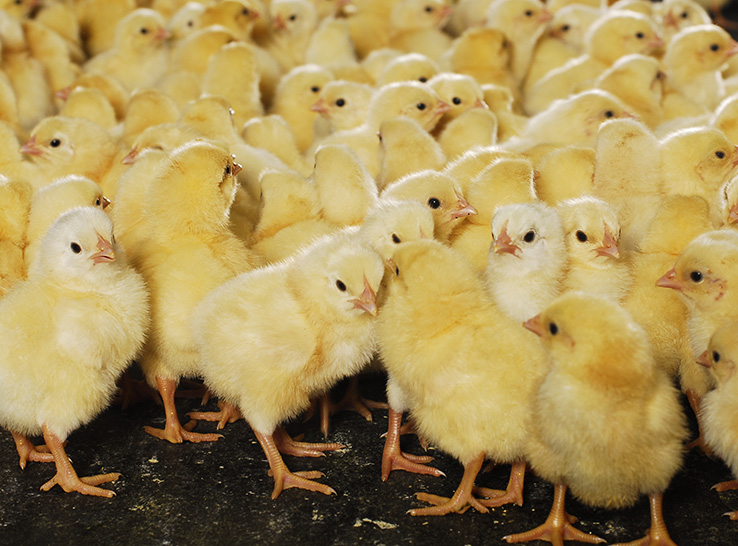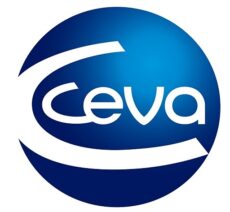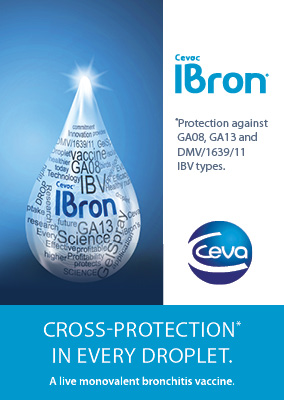A broiler-immunization program centered on a live monovalent vaccine containing the Georgia 08 (GA08) serotype of infectious bronchitis virus (IBV) is showing benefits to protect broilers against the Delmarva/1639 (DMV/1639) serotype of IBV.
“The results we have seen now over 3 consecutive years in this commercial operation represent a true success story for the control of DMV/1639,” says Mark Jackwood, PhD, senior technical advisor at Ceva Animal Health, who has overseen this progress alongside colleague Travis Cigainero, DVM, manager of broiler technical services at Ceva Animal Health.
“The inclusion of the vaccine at 1 day of age as part of a sound vaccination program significantly helped a problem situation, from a point where the IBV DMV/1639 serotype was causing persistent disease to a point today where the disease from this IBV type is under control.”
Powerful option
The vaccine, Cevac™ IBron®, is recommended for use in healthy chickens at 1 day of age or older against IBV caused by GA08 and GA13. However, it also includes a label claim for protection against DMV/1639. In fact, IBron is currently the only fully licensed commercially available vaccine against DMV/1639.
This unique, broad protection offered by the vaccine has proved to be a valuable addition to the toolbox of options available to commercial broiler facilities, say the Ceva technical experts.
Texas turnaround
Case in point is a major success story, now 3 years in the making, at a large commercial broiler facility in southern Texas that processes over 1 million birds per week.
Several years ago, during the winter of 2020-21, a major challenge became apparent at this facility, whereby supervisors began to observe a complex of birds that was experiencing increased airsacculitis, “flat-line” feed and water intake and increased failure to reach the facility’s minimum target market weight of 4 pounds per bird in a timely manner.
This collection of observed problems was quite alarming and brought a lot of urgency to figure out what was going wrong. Ceva technical experts and the complex manager working with the diagnostic laboratory team at Ceva’s Scientific Support and Investigation Unit (SSIU), showed the root cause of the clinical signs was due to DMV/1639.
At the time, the facility’s vaccination program was based upon administering a full dose of a regimen that included a C2 vaccine (a live attenuated Newcastle disease virus vaccine) along with vaccines for the Massachusetts (Mass) and Connecticut (Conn) serotypes of IBV.
“This was a common broiler vaccination program administered at 1 day of age, but one that notably did not directly address DMV/1639 infections,” Jackwood explains.
Finding the right fit
To better protect the birds, the facility managers decided to add a stronger Mass-type vaccine — one reported to provide better cross-protection — to the vaccine program. This change was implemented in January 2021, with some positive results, and even more improvements were noted in the spring and summer months. “This is not unusual as the weather warms up and ventilation increases.”
Clinical signs improved, with less consistent and more sporadic detections of airsacculitis observed at processing. Overall, during this period, detections of DMV/1639 decreased 28% — from nearly 100% to approximately 72% — a significant improvement, though far short of a comprehensive solution.
During the summer months of 2021, facility managers simplified the vaccine regimen from C2/Mass/Conn plus a “stronger cross-protection” Mass to using only the C2 plus the stronger Mass. This updated program then continued for about 18 months, with results continuing to show sporadic airsacculitis and lower but consistent DMV/1639 detections.
“It was observed that DMV/1639 detections would reduce during spring and summer and rebound in fall and winter, but that seasonality is not unusual” Jackwood reports.
The IBron difference
The facility managers considered this situation far from ideal but at least more tolerable. However, this period of modest improvement began to decline significantly during the winter of 2022, with rapidly increasing incidences of respiratory health challenges and hindered performance.
This decline was correlated with a significant rebound of DMV/1639 detections in samples submitted to SSIU for respiratory disease diagnostic panel testing.
The DMV/1639 serotype was found in 100% of problem flocks, along with real time quantitative polymerase chain reaction low-cycle threshold values that indicated the amount of DMV/1639 in the birds was significant.
Disconcertingly, the virus was also now being detected earlier — at 14 days of age versus a previous average beyond 20 days of age.
Ceva technical experts recommended including IBron in the vaccine program. Because of IBron’s unique DMV/1639 protection, it presented an excellent candidate to fit the needs of this facility.
Strong benefits right away
The recommendation by the Ceva technical experts soon proved advantageous — even beyond what they’d hoped for— when the facility began implementing the new regimen of C2 plus IBron at 1 day of age, beginning in May 2022.
We saw strong benefits right away, Jackwood reports. Immediately with the first grow-out, field data showed that feed conversion improved, weight gain increased, flocks were more uniform and airsaculitis significantly decreased.
“It was a very clear before-and-after scenario,” he says. “You could see in the diagnostic data exactly when the change to include IBron was made, with bird health much better following this intervention.”
Even more encouraging, the results have remained consistent, with the new regimen continuing into the summer of 2024.
“Ever since this change in the vaccination program, incredibly there have been no detections of DMV/1639 in the flocks on the C2/IBron program,” Jackwood says.
Furthermore, vaccine reactions have not been reported and, after the addition of IBron, livability increased to approximately 98%.
Consistent, clear data
“The outcome of this case is more dramatic than most, largely due to the unique IBV challenge situation in the area of this facility,” Jackwood says.
“However, our experience with many other companies further shows that a sound vaccination application using IBron at 1 day of age, per the manufacturer’s instructions, effectively protects against challenge with DMV/1639.”
Today at the Texas facility, DMV/1639 detection is virtually non-existent, he says. “All we isolate from those birds is the vaccine virus, which is normal. It has remained clear, ever since this facility started using IBron, how things changed for the better, both in the decrease in the amount of challenge virus in the field and improvement in their production numbers.” (See key results highlighted in Table 1 below.)
For more information on the vaccine, including its ever-growing relevance and results for DMV/1639 protection, click here.
Table 1. Samples submitted to the Ceva diagnostic laboratory for qRT-PCR detection of IBV
|
Date |
Vaccine program |
% of samples positive for DMV/1639 |
|
Feb 2021-April 2021 |
C2/Mass/Conn + Mass | 85.2% |
|
June 2021-Feb 2022 |
C2 + Mass |
79.6% |
| May 2022- Present | C2 + IBron |
0% |
Editor’s note: Content on Modern Poultry’s Industry Insights pages is provided and/or commissioned by our sponsors, who assume full responsibility for its accuracy and compliance.







